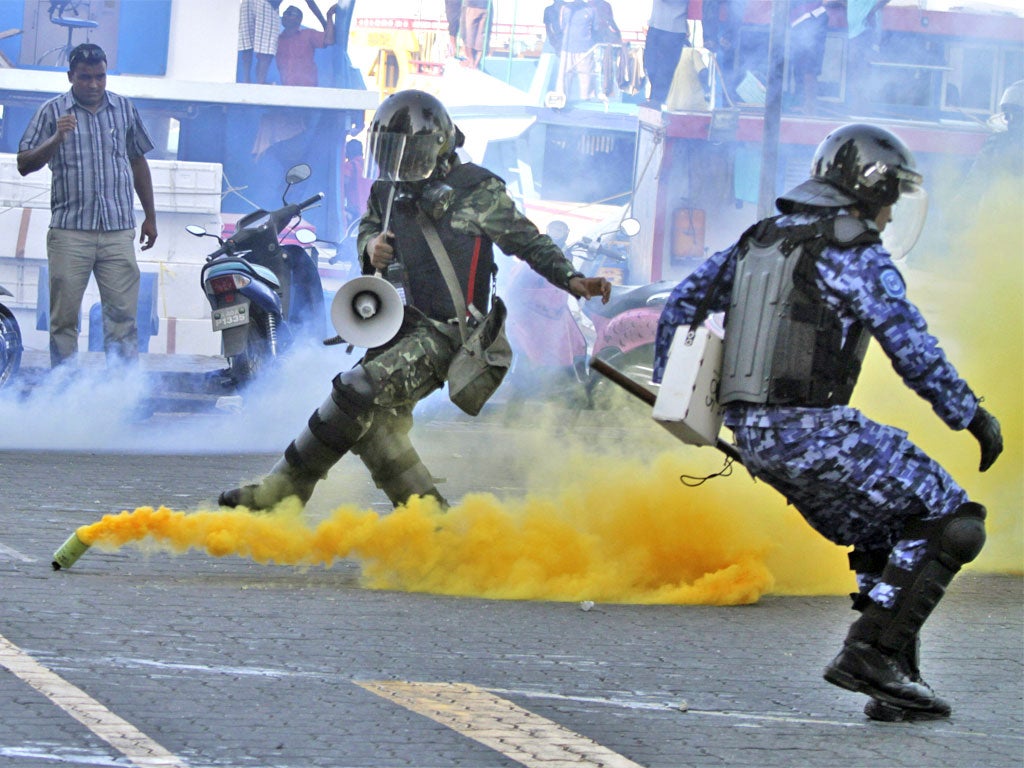I was forced out at gunpoint, claims Maldives ex-leader
Newly sworn-in President denies plotting police coup that saw his predecessor overthrown

The ousted president of the Maldives claimed yesterday he had been forced out at gun-point and said he would fight to regain his position. He accused the vice president – the man who sworn in to replace him – of helping plot the coup that overthrew him.
Yesterday evening, in a potentially portentous development, clashes broke out between police and supporters of Mohamed Nasheed and the former president and at least two of his party members were apparently caught up in baton charges and injured.
“I was forced to resign with guns all around me. They told me, if I don’t resign, they won’t hesitate to use arms,” Mr Nasheed had earlier told reporters. “We will come to power again. We will never step back. I will not accept this coup and will bring justice to the Maldivians.”
Reports said police fired tear gas at the rally and a number of people suffered injuries. Mr Nasheed’s party, the Maldives Democratic Party (MDP), said a several members of parliament had been beaten and arrested. The Associated Press said supporters of Mr Nasheed began rioting in the streets, throwing fire bombs and vandalising a private TV station that had been critical of his government.
The former political prisoner credited with bringing democracy to the Maldives when he defeated the country’s long-term ruler in a 2008 election, fought back a day after he tendered his resignation amid protests by mutinying police. At the time, Mr Nasheed said he was resigning and would be replaced by vice president Mohammed Waheed Hassan because he was not prepared to use violence to quell the disturbances that had been building for several weeks.
But yesterday he said he had no alternative but to quit, his hand having been forced by the military. In an interview with the Agence France-Presse, he said he believed the vice president, widely known as Dr Waheed, had been “in on it”. “I am afraid he’s always entertained an idea to become the president. He’s never been able to do that. When the opportunity was available to him, he took it,” he said.
Dr Waheed, newly sworn in as president, announced he would be forming a “unity government” ahead of elections next year and denied claims there had been a plot to get rid of Mr Nasheed. “It is wrong to describe the events as a coup. We did not know this was going to happen. I was unprepared,” he said. “Together, I am confident we’ll be able to build a stable and democratic country.”
Despite Dr Waheed’s protestations, suggestions that opponents had been hatching a plot against Mr Nasheed have been circulating since last month when a late night meeting of opposition parties – known as the “December 23 alliance” – ended with them declaring support for Dr Waheed and urging him to take control of the government. Many believe former president Maumoon Abdul Gayoom, beaten by Mr Nasheed in 2008, of pulling strings from behind the scenes.
One Western diplomat who asked not to be identified suggested the role of the Maldives’ military would be crucial in deciding what happens next. Representatives of foreign governments have been meeting both various parties and urging restraint. In what will be seen as a significant step, India, the major regional power, announced that prime minister Manmohan Singh had already had a telephone conversation with president Waheed in which the two countries discussed their close ties. The statement made no mention of a coup.
A senior member of Mr Nasheed’s MDP said the party would not join the unity government. The politician added: “We are quite clear. This was a coup and they should step down.”
Last night, the Maldives High Commissioner to Britain, Farah Faizal, annouced her resignation, citing the coup.
Join our commenting forum
Join thought-provoking conversations, follow other Independent readers and see their replies
Comments
Bookmark popover
Removed from bookmarks